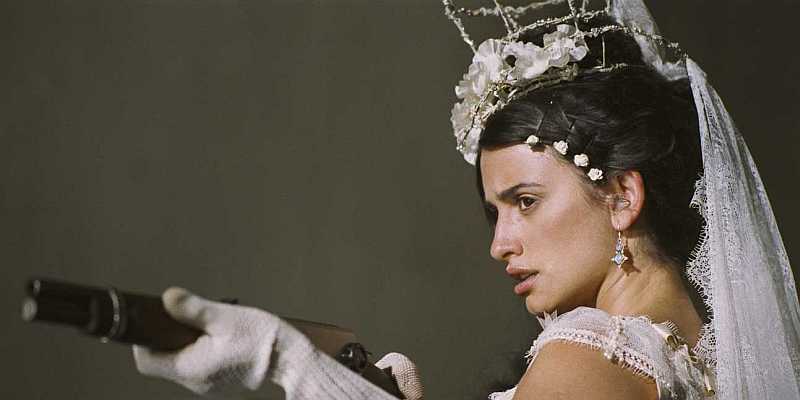 ★★★★
★★★★
“How the West was Wo(ma)n…”
 Let us make no mistake about this, this is a frothy confection of a film, which is not intended to be taken seriously; to do so, would be a serious mistake. The closest parallel here is probably to think of it as a distaff version of Shanghai Noon, with an odd couple teaming up for fun ‘n’ frolics in the Old West. Robber baron Tyler Jackson (Yoakam) comes to Mexico to take away land from the locals so a railroad can be built. In the process, he kills the fathers of both farm-girl Maria (Cruz) and rich-girl Sara (Salma), so he can take their property and bank respectively. To get revenge, each lady independently decides to rob the same bank at the same time, and are forced to team-up; their widely-disparate characters initially cause friction, but they eventally come to respect each other, after being trained by retired robber Bill Buck (Sam Shephard).
Let us make no mistake about this, this is a frothy confection of a film, which is not intended to be taken seriously; to do so, would be a serious mistake. The closest parallel here is probably to think of it as a distaff version of Shanghai Noon, with an odd couple teaming up for fun ‘n’ frolics in the Old West. Robber baron Tyler Jackson (Yoakam) comes to Mexico to take away land from the locals so a railroad can be built. In the process, he kills the fathers of both farm-girl Maria (Cruz) and rich-girl Sara (Salma), so he can take their property and bank respectively. To get revenge, each lady independently decides to rob the same bank at the same time, and are forced to team-up; their widely-disparate characters initially cause friction, but they eventally come to respect each other, after being trained by retired robber Bill Buck (Sam Shephard).
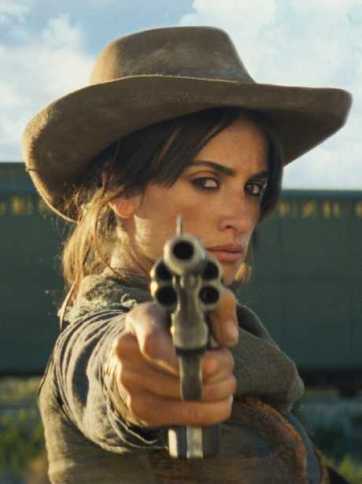 When they start their campaign, Jackson brings in a specialist in the new ‘scientific method’ of criminal investigation, Quentin (Zahn), to help track down the bandidas. However, after discovering Sara’s father was poisoned, heis convinced by the pair that he is actually working for the wrong side, and comes across to join them. The latest security measures are defeated – with the aid of a pair of ice-skates! – and as a result a train is loaded with the Mexican government’s gold reserve, to ship it to safety in Mexico. The bandidas resolve to take the cargo, but Jackson and his gang are waiting for them…as is Quentin’s fiancée…
When they start their campaign, Jackson brings in a specialist in the new ‘scientific method’ of criminal investigation, Quentin (Zahn), to help track down the bandidas. However, after discovering Sara’s father was poisoned, heis convinced by the pair that he is actually working for the wrong side, and comes across to join them. The latest security measures are defeated – with the aid of a pair of ice-skates! – and as a result a train is loaded with the Mexican government’s gold reserve, to ship it to safety in Mexico. The bandidas resolve to take the cargo, but Jackson and his gang are waiting for them…as is Quentin’s fiancée…
This was co-written by Luc Besson: he is the engine-room of European cinema, listed as a producer of no less than 60 titles over the past five years on the IMDB. He likely deserves a place in the Girls With Guns hall of fame, having directed Nikita and The Messenger, given Milla Jovovich and Natalie Portman their action-debuts in The Fifth Element and Leon respectively, worked as an uncredited co-producer on Haute Tension, and now delivers this. It came up in response to a request from the two leads, who’ve wanted to work together for a long time, and he handed the script to two Norwegians, making their feature debut [but with a lot of commercial experience].
However, there’s no doubt that it’s the leading ladies who make this one click, right from the first scene together, where Sara confronts Maria, who has snuck in to the house to argue with Sara’s father about the ongoing land-grab. The bickering between the two, which continues, in an increasingly friendly way, through the entire film. Maria snipes at Sara because the latter can’t fire a gun to save her life – in a beautiful touch, she gets terrible hiccups when she tries; Sara taunts Maria for her lack of education.
The two also argue over who is the best kisser, notably in a scene where they are dressed as Paris showgirls, and are trying to extract information from Quentin, who is tied to the bed. And Steve Zaun was actually paid to take part? ;-) That’s about as far as the film goes, sexually speaking; much cleavage, but no actual nudity. A fondness for the heroines splashing around in water, especially early on, and the above-mentioned comedic seduction scene, is about as close as we get to exploitation. That news may disappoint some readers, but it really wouldn’t be in keeping with the overall tone of the movie, which is light-hearted and firmly PG-13 rated, despite lesbian scuttlebutt which circulated afte a press conference where Penelope (gasp!) touched Salma’s butt.
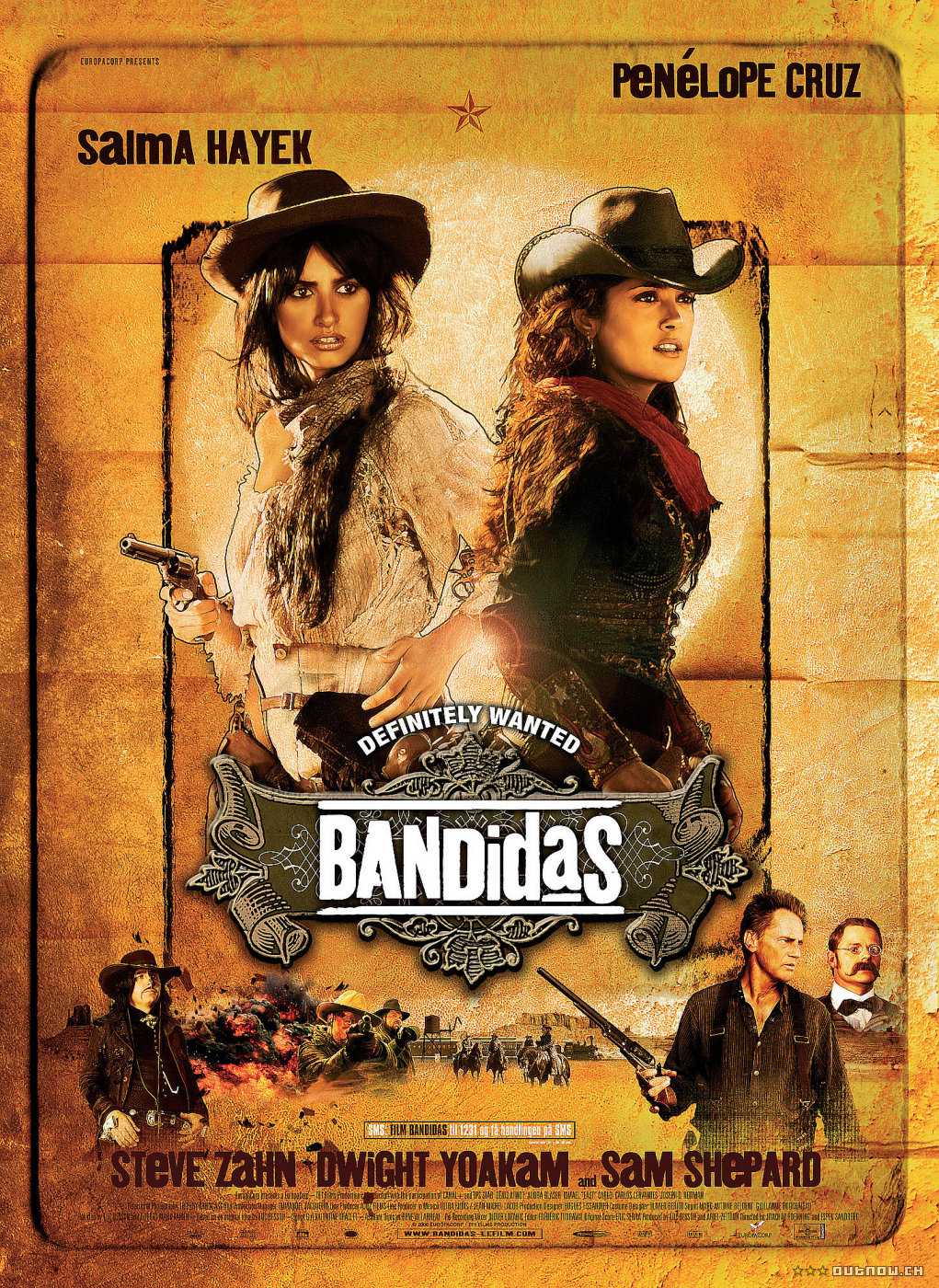 What did disappoint me was the action. I expected more from Besson, who helped give us such gems as The Transporter and District B-13, as well as the titles mentioned above, though a couple of moments stand out. There’s a bravura slow-motion scene in the final battle – bullets, knives, bodies and debris fly in a single shot, the camera panning back and forth to capture the carnage. But, the most amazing part is seeing a horse, with a rider on its back, climb a ladder. This was apparently a combination of training (the horse, with a stunt rider, walked up a specially-made set of stairs) and CGI work by Parisian FX house Macguff, to replace the stairs with a ladder, add dust and bounce, etc. It’s a throwaway moment, in a throwaway film, but is worthy of note, and applause.
What did disappoint me was the action. I expected more from Besson, who helped give us such gems as The Transporter and District B-13, as well as the titles mentioned above, though a couple of moments stand out. There’s a bravura slow-motion scene in the final battle – bullets, knives, bodies and debris fly in a single shot, the camera panning back and forth to capture the carnage. But, the most amazing part is seeing a horse, with a rider on its back, climb a ladder. This was apparently a combination of training (the horse, with a stunt rider, walked up a specially-made set of stairs) and CGI work by Parisian FX house Macguff, to replace the stairs with a ladder, add dust and bounce, etc. It’s a throwaway moment, in a throwaway film, but is worthy of note, and applause.
That may be perhaps down to the leads’ lack of experience: Cruz’s only real brush with the action genre was Sahara, Hayek has more background (working with Robert Rodriguez helps there), but neither of them would appear to be looking to make a name for themselves with their work here. A sequel is hinted at by the ending; however, that this $30m production went all but straight to video in the US and notched only $18m overseas would seem to rule this out. One wonders why, for a film set in Mexico and with two Hispanic leads, why they didn’t speak Spanish; one assumes Besson, with his eye on the international market, went for the more commercial English, even though Cruz seems slightly ill-at-ease thee.
These qualms are relatively minor, and if not the all-out action fest I was hoping for, it’s certainly among the best Westernettes of recent years. This is not a genre which has been kind to action heroines in the past, including such bombs – justifiable or not – as Bad Girls and The Quick and the Dead, as well as less high-profile turkeys as Gang of Roses. Bandidas is nowhere in the same league, and if survives almost entirely on the charisma and energy of Cruz and Hayek, that’s by itself is something which most movies would like to have. If you can certainly argue that to some extent this is a vanity project, here, I’d be very hard pushed to call vanity a sin.
Dir: Joachim Rønning and Espen Sandberg
Stars: Penelope Cruz, Salma Hayek, Steve Zahn, Dwight Yoakam
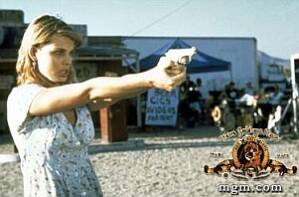
 It’s not often I criticise a film for too much explanation, but Retroactive might have been better off with more hand-waving. I’ll explain later; first, the plot. Travis plays Karen, a police negotiator who just screwed up badly; driving down South she ends up hitching a ride with Frank (Belushi) and his abused wife Rayanne (Whirry). Frank is a psycho, and Karen ends up sheltering in a secret lab where time-travel experiments are going on – she ends up with another chance to deal with Frank, only to discover this second attempt may not be an improvement…
It’s not often I criticise a film for too much explanation, but Retroactive might have been better off with more hand-waving. I’ll explain later; first, the plot. Travis plays Karen, a police negotiator who just screwed up badly; driving down South she ends up hitching a ride with Frank (Belushi) and his abused wife Rayanne (Whirry). Frank is a psycho, and Karen ends up sheltering in a secret lab where time-travel experiments are going on – she ends up with another chance to deal with Frank, only to discover this second attempt may not be an improvement…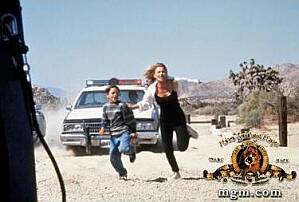 Our qualms were largely because, unlike Run Lola Run or Groundhog Day, which made no attempt to explain what was happening, here there’s just enough logic to be unsatisfying. The “rules” are clearly important – for example, do time-travellers keep their memories? – yet are inadequately laid out. We spent the last 15 minutes with furrowed brows, trying to see if it made sense. It may, or may not, but either way was an unwelcome diversion in an otherwise pleasant surprise.
Our qualms were largely because, unlike Run Lola Run or Groundhog Day, which made no attempt to explain what was happening, here there’s just enough logic to be unsatisfying. The “rules” are clearly important – for example, do time-travellers keep their memories? – yet are inadequately laid out. We spent the last 15 minutes with furrowed brows, trying to see if it made sense. It may, or may not, but either way was an unwelcome diversion in an otherwise pleasant surprise.




 ★★★★
★★★★ When they start their campaign, Jackson brings in a specialist in the new ‘scientific method’ of criminal investigation, Quentin (Zahn), to help track down the bandidas. However, after discovering Sara’s father was poisoned, heis convinced by the pair that he is actually working for the wrong side, and comes across to join them. The latest security measures are defeated – with the aid of a pair of ice-skates! – and as a result a train is loaded with the Mexican government’s gold reserve, to ship it to safety in Mexico. The bandidas resolve to take the cargo, but Jackson and his gang are waiting for them…as is Quentin’s fiancée…
When they start their campaign, Jackson brings in a specialist in the new ‘scientific method’ of criminal investigation, Quentin (Zahn), to help track down the bandidas. However, after discovering Sara’s father was poisoned, heis convinced by the pair that he is actually working for the wrong side, and comes across to join them. The latest security measures are defeated – with the aid of a pair of ice-skates! – and as a result a train is loaded with the Mexican government’s gold reserve, to ship it to safety in Mexico. The bandidas resolve to take the cargo, but Jackson and his gang are waiting for them…as is Quentin’s fiancée… What did disappoint me was the action. I expected more from Besson, who helped give us such gems as The Transporter and District B-13, as well as the titles mentioned above, though a couple of moments stand out. There’s a bravura slow-motion scene in the final battle – bullets, knives, bodies and debris fly in a single shot, the camera panning back and forth to capture the carnage. But, the most amazing part is seeing a horse, with a rider on its back, climb a ladder. This was apparently a combination of training (the horse, with a stunt rider, walked up a specially-made set of stairs) and CGI work by Parisian FX house Macguff, to replace the stairs with a ladder, add dust and bounce, etc. It’s a throwaway moment, in a throwaway film, but is worthy of note, and applause.
What did disappoint me was the action. I expected more from Besson, who helped give us such gems as The Transporter and District B-13, as well as the titles mentioned above, though a couple of moments stand out. There’s a bravura slow-motion scene in the final battle – bullets, knives, bodies and debris fly in a single shot, the camera panning back and forth to capture the carnage. But, the most amazing part is seeing a horse, with a rider on its back, climb a ladder. This was apparently a combination of training (the horse, with a stunt rider, walked up a specially-made set of stairs) and CGI work by Parisian FX house Macguff, to replace the stairs with a ladder, add dust and bounce, etc. It’s a throwaway moment, in a throwaway film, but is worthy of note, and applause.












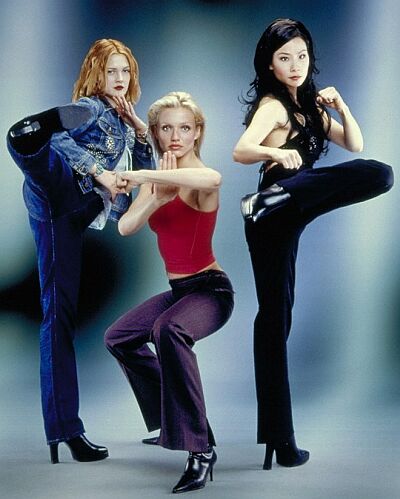
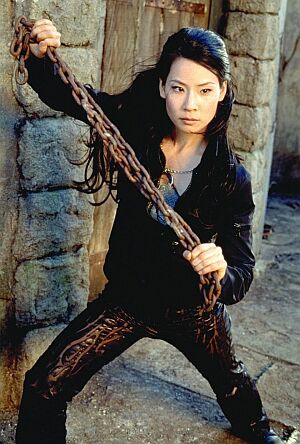 If there’s nothing there to keep you interested, the film makes up for it in lots of other ways. The aim was to make it seem like turning pages of a comic-book, and this certainly succeeds – there’s always something going on. While the nods to political correctness are kinda irritating (the villain and all his henchmen can muster precisely one gun between them), no-one is really taking it seriously, and the tongue-in-cheek approach saves the whole thing. The supporting cast are good, too: Bill Murray as their overseer is his usual laconic self, while Kelly Lynch and Crispin Glover give good support to Sam Rockwell.
If there’s nothing there to keep you interested, the film makes up for it in lots of other ways. The aim was to make it seem like turning pages of a comic-book, and this certainly succeeds – there’s always something going on. While the nods to political correctness are kinda irritating (the villain and all his henchmen can muster precisely one gun between them), no-one is really taking it seriously, and the tongue-in-cheek approach saves the whole thing. The supporting cast are good, too: Bill Murray as their overseer is his usual laconic self, while Kelly Lynch and Crispin Glover give good support to Sam Rockwell.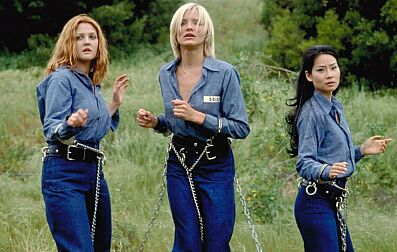 The pacing is a little weird though; apart from one impressive battle between the trio and Crispin Glover in a back-alley (to the tune of the Prodigy’s Smack My Bitch Up), all the martial arts is concentrated in one 20-minute span near the end. At one point we have Cameron Diaz taking on Kelly Lynch, Lucy Liu going toe-to-toe with Glover and Drew Barrymore taking on a whole roomful at virtually the same time, and the cross-cutting does get a little aggravating. Barrymore’s battle is very show-offish: she tells her opponents what she’s going to do, pauses in mid-stream to name the fighting techniques, and moonwalks out of there when she’s done. A tap on the wrist and a warning
The pacing is a little weird though; apart from one impressive battle between the trio and Crispin Glover in a back-alley (to the tune of the Prodigy’s Smack My Bitch Up), all the martial arts is concentrated in one 20-minute span near the end. At one point we have Cameron Diaz taking on Kelly Lynch, Lucy Liu going toe-to-toe with Glover and Drew Barrymore taking on a whole roomful at virtually the same time, and the cross-cutting does get a little aggravating. Barrymore’s battle is very show-offish: she tells her opponents what she’s going to do, pauses in mid-stream to name the fighting techniques, and moonwalks out of there when she’s done. A tap on the wrist and a warning 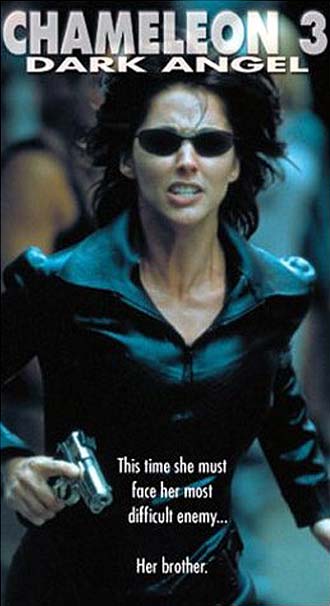
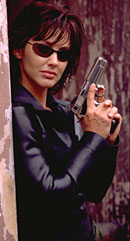 I imagine no-one genuinely doubts the answer, but this adds a whole new plot twist, especially as the last time the Mongoose activated his weapon, its impact was pretty heavy. What happens when it’s used here is never really shown, and there is some scientific handwaving about the black hole absorbing all the energy, but it would be gratifying to think that it became necessary to destroy the city in order to save it. Not least because Cameron’s Dark Angel
I imagine no-one genuinely doubts the answer, but this adds a whole new plot twist, especially as the last time the Mongoose activated his weapon, its impact was pretty heavy. What happens when it’s used here is never really shown, and there is some scientific handwaving about the black hole absorbing all the energy, but it would be gratifying to think that it became necessary to destroy the city in order to save it. Not least because Cameron’s Dark Angel  ★★★★
★★★★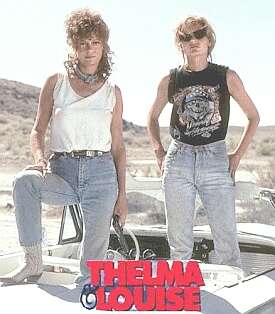 But to quote one character in the movie, “Bitches from
But to quote one character in the movie, “Bitches from 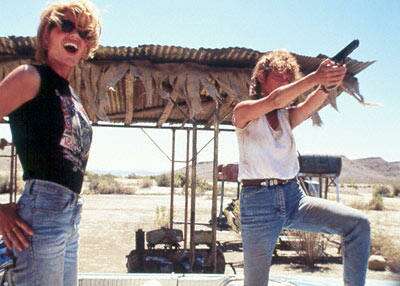 It becomes like having Andrea Dworkin yelling in your face for two hours, yet the film’s moral is that if women empower themselves, death inevitably results. Khouri seems to be saying, “You can only beat the system by suicide,” while the patriarchy watches from behind its sunglasses and firearms. We
It becomes like having Andrea Dworkin yelling in your face for two hours, yet the film’s moral is that if women empower themselves, death inevitably results. Khouri seems to be saying, “You can only beat the system by suicide,” while the patriarchy watches from behind its sunglasses and firearms. We 
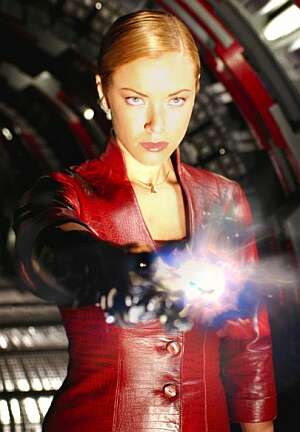 I feel a certain camaraderie with Arnie, since I’ve largely grown up alongside this series of movies, which is probably his finest work. I was at university when the first one came out; the second saw me living the life of a bachelor in London; and the latest installment finds me a happily married man in Arizona. Just as I’ve evolved, so have his opponents: they’ve become harder, faster and more difficult to kill; my sarcasm has been honed to a lethal edge, thanks to living with two teenagers and a pair of dogs.
I feel a certain camaraderie with Arnie, since I’ve largely grown up alongside this series of movies, which is probably his finest work. I was at university when the first one came out; the second saw me living the life of a bachelor in London; and the latest installment finds me a happily married man in Arizona. Just as I’ve evolved, so have his opponents: they’ve become harder, faster and more difficult to kill; my sarcasm has been honed to a lethal edge, thanks to living with two teenagers and a pair of dogs.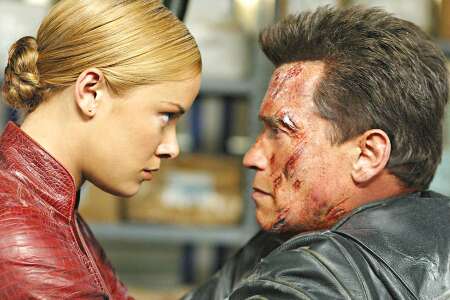 The plot is effectively a retread of the previous entry, with John Connor (Stahl) a drug-confused member of the underclass since his mother died of leukemia (possibly Hollywoodese for “Linda Hamilton wanted too much money”). He goes on the run with former schoolmate Kate (Danes), whose father just happens to be the guy in charge of SkyNet. What are the odds against that? These two are supposed to meet and fall in love, but there’s a bump on their road to happiness, in the shape of a nuclear war due to start at 6:18 pm that night.
The plot is effectively a retread of the previous entry, with John Connor (Stahl) a drug-confused member of the underclass since his mother died of leukemia (possibly Hollywoodese for “Linda Hamilton wanted too much money”). He goes on the run with former schoolmate Kate (Danes), whose father just happens to be the guy in charge of SkyNet. What are the odds against that? These two are supposed to meet and fall in love, but there’s a bump on their road to happiness, in the shape of a nuclear war due to start at 6:18 pm that night.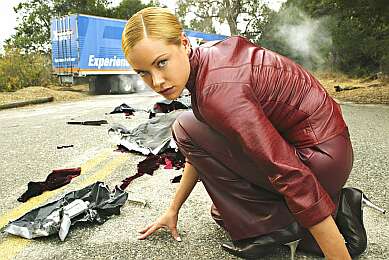 One interesting point, is that nobody ever mentions the T-X’s gender. The concept certainly held potential for a lot of PMS-type comments, but save for one minor joke involving Victoria’s Secret, sexuality is entirely kept out of things. The T-X, with her impossibly perfect hair and the coolest red leather jacket worn by a actress playing a superviolent female robot since Eve of Destruction, just goes about her business like an evil babysitter.
One interesting point, is that nobody ever mentions the T-X’s gender. The concept certainly held potential for a lot of PMS-type comments, but save for one minor joke involving Victoria’s Secret, sexuality is entirely kept out of things. The T-X, with her impossibly perfect hair and the coolest red leather jacket worn by a actress playing a superviolent female robot since Eve of Destruction, just goes about her business like an evil babysitter.